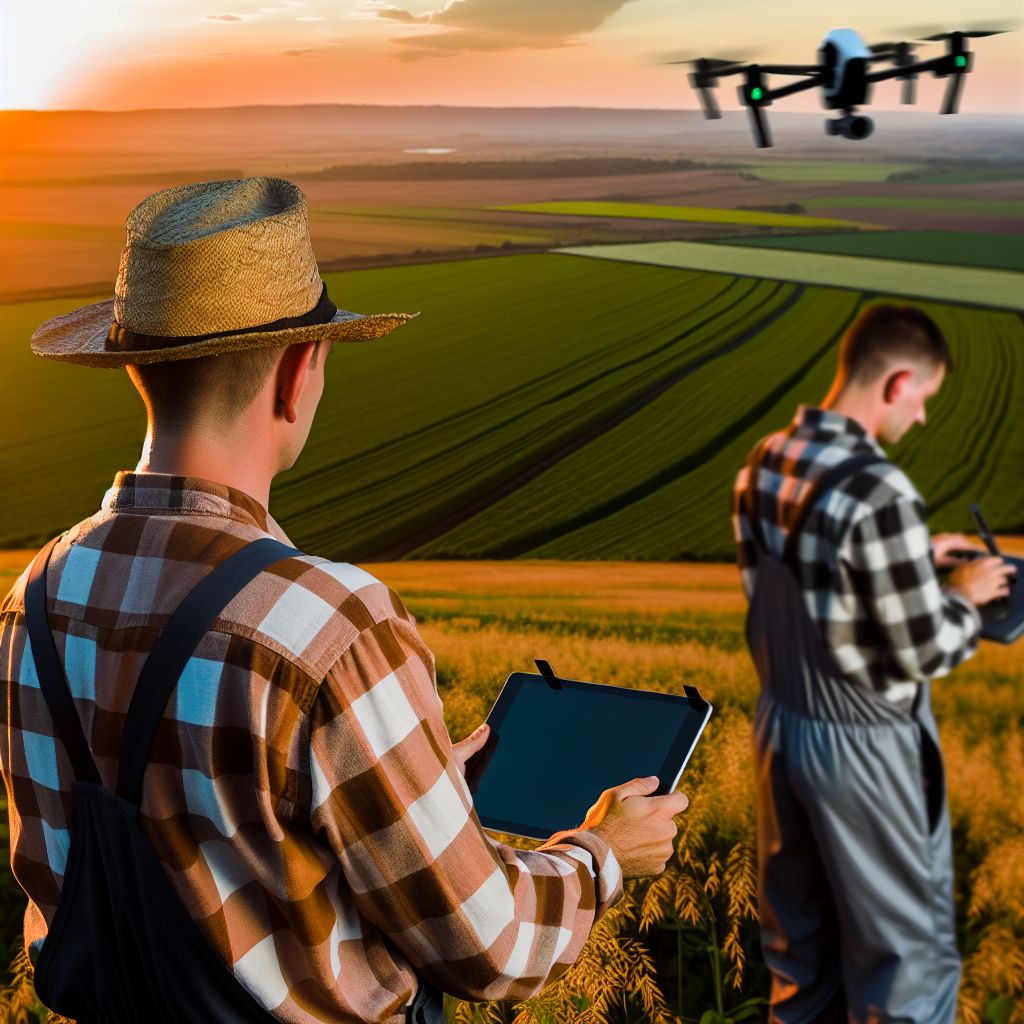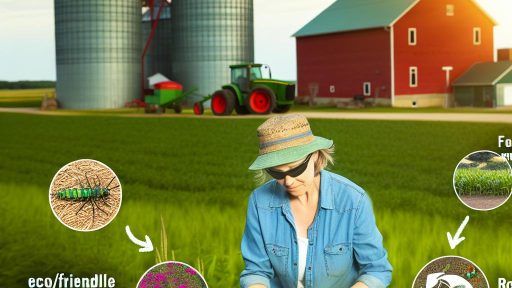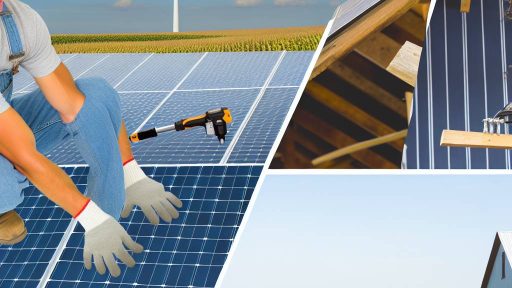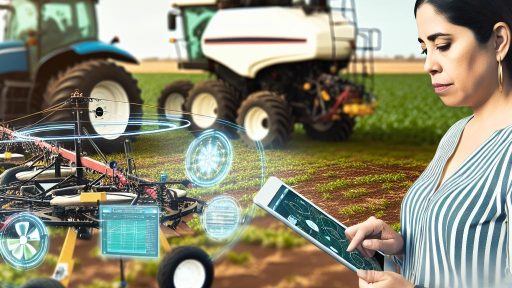Introduction to Drones in Agriculture
Drones are transforming the landscape of precision farming.
They provide innovative solutions for modern agricultural practices.
Farmers now harness drones for various applications.
These applications range from crop monitoring to precision spraying.
Enhanced Data Collection
Drones facilitate high-resolution aerial imagery.
This imagery helps farmers assess crop health efficiently.
Data collected can guide decisions about irrigation and fertilization.
Consequently, farmers reduce waste and increase productivity.
Improving Crop Management
With drones, farmers can oversee large areas quickly.
They identify issues such as pest infestations early.
This early detection leads to timely interventions.
As a result, crops receive necessary care before problems escalate.
Precision Application Techniques
Drones allow for targeted application of fertilizers and pesticides.
This method minimizes chemical use significantly.
Farmers can apply treatments precisely where needed.
Transform Your Agribusiness
Unlock your farm's potential with expert advice tailored to your needs. Get actionable steps that drive real results.
Get StartedUltimately, this practice reduces environmental impact.
Crop Mapping and Analysis
Drones create detailed crop maps using advanced sensors.
These maps support precise management decisions throughout the season.
Farmers can analyze crop conditions based on real-time data.
Such insights empower them to optimize yields effectively.
Cost-Efficiency and Accessibility
Operating drones can be more cost-effective than traditional methods.
Farmers save on labor costs without sacrificing efficiency.
Drones can cover vast areas in a fraction of the time.
Therefore, they are accessible tools for farmers of any size.
Benefits of Drones in Agriculture
Drones are redefining precision farming in essential ways.
They enhance data collection, improve crop management, and reduce costs.
Farmers benefit from developing technologies that ensure sustainability.
This modern approach marks a significant step forward in agriculture.
Benefits of Using Drones for Crop Monitoring and Health Assessment
Enhanced Crop Surveillance
Drones provide an efficient way to monitor large fields.
They capture high-resolution images of crops from above.
This aerial viewpoint allows for better assessment of crop health.
Farmers can detect issues early, such as disease or pest infestations.
Consequently, timely interventions can be made to protect yields.
Improved Data Collection
Drones gather vast amounts of data quickly and accurately.
They utilize sensors to collect information on temperature and moisture levels.
This data helps farmers understand field variability better.
As a result, they can make more informed decisions regarding crop management.
Additionally, precise data analysis aids in optimizing resource use.
Cost-Effective Monitoring
Using drones reduces the labor required for field inspections.
Showcase Your Farming Business
Publish your professional farming services profile on our blog for a one-time fee of $200 and reach a dedicated audience of farmers and agribusiness owners.
Publish Your ProfileThis technology minimizes travel time across fields, saving fuel costs.
Farmers can cover more ground in less time, thus increasing efficiency.
Overall, investing in drone technology leads to long-term savings.
Precision Agriculture Integration
Drones integrate seamlessly with precision agriculture practices.
They enhance the ability to apply inputs, like water and fertilizers, accurately.
Farmers can target specific areas based on drone data insights.
This targeted approach reduces waste and increases crop productivity.
Furthermore, it supports sustainable farming practices.
Different Types of Drones and Their Applications in Farming
Fixed-Wing Drones
Fixed-wing drones are well-suited for covering large areas quickly.
They glide through the air, providing efficient data collection for farmers.
Farmers use them mainly for crop mapping and monitoring.
Additionally, they can perform multispectral imaging to assess crop health.
Multi-Rotor Drones
Multi-rotor drones excel in versatility and agility.
They can hover, making them ideal for detailed inspections.
Farmers often deploy them for precision spraying of pesticides and fertilizers.
Moreover, they capture high-resolution images of crops from various angles.
Hybrid Drones
Hybrid drones combine features from both fixed-wing and multi-rotor designs.
This design allows for efficient long-distance flight with hovering capability.
Farmers appreciate their ability to conduct extensive surveys and localized tasks.
Thus, hybrid drones serve multiple purposes in modern agriculture.
Applications in Precision Agriculture
Drones enhance precision agriculture by providing real-time data analysis.
They help monitor plant health, soil conditions, and water usage effectively.
Farmers utilize drone data to make informed decisions about crop management.
Furthermore, these tools optimize resource allocation and reduce waste.
Benefits of Using Drones
Drones increase efficiency in farming operations significantly.
They save time by quickly covering large fields.
Using drones also lowers labor costs related to manual inspections.
Finally, they provide detailed insights, leading to better yields.
Discover More: Diversifying Revenue Streams In Agricultural Enterprises Successfully
How Drones Improve Efficiency in Irrigation Management
The Role of Drones in Irrigation Monitoring
Drones provide accurate and timely data for irrigation practices.
They employ advanced sensors to assess soil moisture levels.
Farmers can then make informed decisions about irrigation schedules.
This capability leads to reduced water waste and improved crop health.
Precision Agriculture and Water Distribution
With drones, farmers can map their fields effectively.
This mapping helps identify areas needing more or less water.
Consequently, irrigation becomes more targeted and efficient.
Thus, farmers optimize their water distribution systems significantly.
Cost Savings Through Enhanced Efficiency
Utilizing drones reduces the need for manual labor in monitoring irrigation.
Labor costs decrease as drones perform tasks faster and more efficiently.
Moreover, precise irrigation lowers water bills for farmers.
Showcase Your Farming Business
Publish your professional farming services profile on our blog for a one-time fee of $200 and reach a dedicated audience of farmers and agribusiness owners.
Publish Your ProfileThis leads to greater overall savings for agricultural operations.
Data Analytics for Predictive Irrigation
Drones collect large amounts of data to analyze irrigation needs.
Farmers can utilize this data to predict water requirements.
As a result, they can prepare for seasonal variations effectively.
This predictive capability enhances overall farm resilience.
Implementing Drone Technology in Farms
Many farming operations have started adopting drone technologies.
Training programs assist farmers in utilizing drone capabilities.
Additionally, companies offer drone services for irrigation management.
These services provide expertise without the need for additional equipment.
Learn More: Overcoming Common Supply Chain Challenges in Farming
Utilizing Drones for Soil Analysis and Nutrient Management
Introduction to Drone Technology in Agriculture
Drones are revolutionizing modern agriculture.
They provide valuable data for soil analysis.
Farmers can make informed decisions quickly.
This technology enhances nutrient management practices.
Benefits of Drone Soil Analysis
Drones offer high-resolution aerial imagery.
This imagery helps identify soil variation across fields.
Farmers can assess soil health and moisture levels.
Additionally, they can map nutrient deficiencies efficiently.
Using drones reduces the time and cost of soil testing.
Techniques for Soil Analysis Using Drones
Several techniques exist for analyzing soil with drones.
Multispectral imaging captures data beyond visible light.
This method reveals vegetation health and soil conditions.
Thermal imaging detects soil moisture levels too.
Combining these techniques yields comprehensive insights.
Improving Nutrient Management
Drones assist in targeted nutrient application.
Farmers can apply fertilizers precisely where needed.
This approach minimizes waste and environmental impact.
Utilizing drones increases crop yield and quality.
Case Studies of Successful Drone Implementation
Many farmers have successfully integrated drone technology.
One case study involves Green Fields Farm.
They improved soil nutrient mapping using drones.
As a result, they increased crop yield by 30%.
Another example is Lakeview Orchards.
They optimized their irrigation practices through drone data.
This led to significant water savings and enhanced fruit quality.
Future Trends in Drone Soil Analysis
The future holds even more advancements for drone technology.
Innovations in AI and machine learning will emerge.
These tools will enhance data interpretation and analysis.
More farmers will benefit from automated nutrient management.
Ultimately, drones will become essential in precision agriculture.
Showcase Your Farming Business
Publish your professional farming services profile on our blog for a one-time fee of $200 and reach a dedicated audience of farmers and agribusiness owners.
Publish Your ProfileUncover the Details: Niche Markets and Opportunities for Farm Diversification

Case Studies: Successful Implementation of Drones in Various Farms
Precision Crop Monitoring at Green Acres Farm
Green Acres Farm applied drone technology for crop monitoring.
The drones provided real-time data on crop conditions.
Farmers utilized this data to assess plant health effectively.
This approach allowed for timely interventions when needed.
As a result, Green Acres reported a 15% increase in yields.
Efficient Irrigation Management at Sunny Fields
They integrated drones to identify irrigation issues swiftly.
The drones mapped areas with inconsistent moisture levels.
Farmers used this information to optimize irrigation systems.
Consequently, they reduced water usage by 20%.
Pest Control Strategies at Oak Hill Orchards
Oak Hill Orchards adopted drones for pest surveillance.
With aerial imagery, they detected pest infestations early.
This early detection enabled targeted pesticide application.
As a result, they minimized pesticide usage significantly.
Moreover, this practice enhanced the health of beneficial insects.
Field Mapping and Analysis at River Valley Farms
River Valley Farms employed drones for comprehensive field mapping.
The data provided insights into soil variability and nutrient levels.
Farmers adjusted fertilizer applications based on this analysis.
This method led to improved crop nutrient uptake.
Ultimately, they achieved more uniform crop growth across fields.
Overall Benefits Realized Through Drone Technology
These case studies demonstrate the effectiveness of drones.
The technology promotes precision farming and sustainable practices.
Farmers gain better insights into their operations with drone data.
Greater efficiency leads to cost savings and improved yields.
Thus, drones represent a transformative tool in modern agriculture.
Delve into the Subject: Streamlining Agricultural Supply Chains for Greater Profit
Regulations and Legal Considerations for Drone Usage in Agriculture
Understanding UAV Regulations
Drones are subject to various regulations imposed by governmental authorities.
The Federal Aviation Administration (FAA) oversees drone operations in the U.S.
Farmers must register their drones with the FAA for commercial use.
Moreover, pilots need to obtain a Remote Pilot Certificate to operate these drones legally.
Airspace Restrictions
Agricultural drone operators must be aware of airspace classifications.
Some airspaces restrict drone flights to enhance safety and security.
Understanding Temporary Flight Restrictions (TFRs) is crucial for compliance.
Operators should also avoid flying near airports and military zones.
Privacy and Data Collection Laws
Using drones for agricultural purposes raises privacy concerns.
Farmers must respect the privacy of neighboring properties when flying drones.
Additionally, they should comply with data protection laws when collecting information.
This includes obtaining consent if necessary from individuals or businesses involved.
Insurance and Liability Considerations
Insurance plays a vital role in protecting drone operators in agriculture.
Showcase Your Farming Business
Publish your professional farming services profile on our blog for a one-time fee of $200 and reach a dedicated audience of farmers and agribusiness owners.
Publish Your ProfileFarmers should consider liability insurance to cover potential incidents.
Furthermore, they must be aware of their responsible use of drones to minimize risk.
Many insurance providers offer policies specifically tailored for agricultural drones.
Local Regulations and Best Practices
Beyond federal regulations, local laws often apply to drone usage.
Agricultural producers should stay informed about state and local guidelines.
Networking with local agricultural organizations can provide valuable insights.
Adopting best practices will enhance compliance and operational efficiency.
Future Trends: The Role of AI and Machine Learning in Drone Technology
Introduction to AI and Machine Learning in Agriculture
AI and machine learning are transforming precision farming.
Drones equipped with these technologies enhance farming efficiency.
They provide real-time data for better decision-making.
Improved Crop Monitoring
Drones analyze crop health through aerial imagery.
AI algorithms process these images for detailed insights.
Farmers can detect diseases and nutrient deficiencies early.
Consequently, this allows for timely interventions.
Optimizing Resource Usage
Machine learning models help in resource allocation.
Drones can determine optimal irrigation patterns.
This reduces water waste and improves yields.
In addition, they optimize fertilizer application based on needs.
Data Integration and Predictive Analytics
Drones collect diverse data types from the field.
AI integrates this data to create predictive models.
Farmers can forecast crop performance under various conditions.
This enhances planning and reduces risks.
Automation and Efficiency
AI-driven drones automate routine farm tasks.
They can plant seeds and spray pesticides efficiently.
Automation saves time and labor costs significantly.
As a result, farmers can focus on strategic activities.
Future Advancements in Drone Technology
Technological advancements will enhance drone capabilities.
We expect improvements in battery life and payload capacities.
Bigger data sets will fine-tune AI algorithms.
This will lead to even more precise farming methods.
Challenges and Considerations
Despite the benefits, challenges persist in drone adoption.
Regulatory hurdles and privacy concerns need addressing.
Moreover, data security is a growing concern for farmers.
Comprehensive guidelines can mitigate these issues.
The Path Forward
Collaboration among tech developers and farmers will be crucial.
Education on drone technology will aid in widespread adoption.
As adoption grows, so will the benefits to agriculture.
Drones will be pivotal in the future of sustainable farming.
Additional Resources
Implementation of artificial intelligence in agriculture for optimisation …
Conservation Innovation Grants Awards Fiscal Year 2023 | Natural …
Showcase Your Farming Business
Publish your professional farming services profile on our blog for a one-time fee of $200 and reach a dedicated audience of farmers and agribusiness owners.
Publish Your Profile



